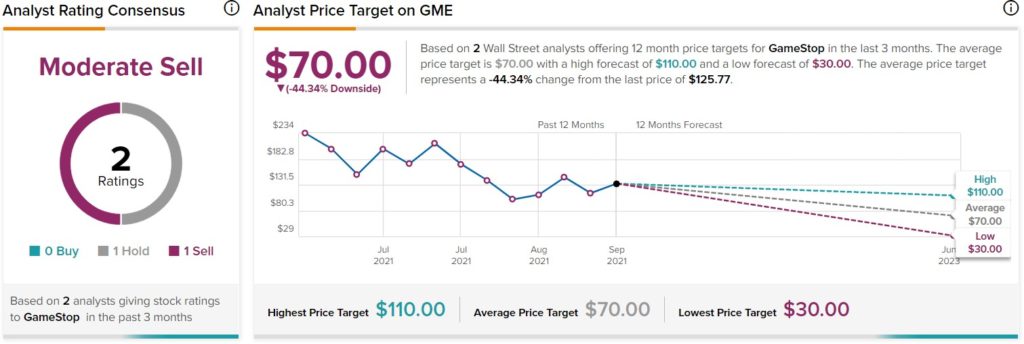GameStop (GME) stock has fallen 2.6% this week but still outperformed the S&P 500 (SPX), which shed around 5.9% so far this week due to recession and inflation fears. Moreover, GameStop is relishing a modest revenue growth as it decides to transition away from its traditional brick-and-mortar business.
In addition, the company’s plan to grab opportunities in e-commerce and cryptocurrency makes GME an interesting play in the interim. However, it’s likely not a stock you’d want to bet on over the long term. I am neutral on GME stock.
The company reported revenues of $1.38 billion in its first quarter of 2022, compared to the $1.27 billion it reported in the last quarter of 2021. However, revenue growth doesn’t seem all that appealing, considering it reported a $157.9 million net loss, far worse than the $66.8 million net loss it made in the previous quarter. Hence, its fundamentals are as shaky as ever, but the surge in revenues could provide fodder for short-term investors.

GME Trembles as the Company Makes a Pivot
GameStop earned around $673.8 million in Hardware sales, making up 48.9% of total revenues. Unfortunately, the number is well below the $703.5 million in sales made in the last quarter. The company generated $483.7 million in Software revenue and $220.9 million in Collectibles revenue in the year-ago quarter. In contrast, GameStop stepped forward as the Software and Collectibles revenues increased by $85.5 million and $177 million, respectively.
GameStop’s performance in collectibles indicates why it is inclined towards non-fungible tokens. Non-fungible tokens are a new and popular type of digital keepsake that people gather and resell. The digital articles are strapped to the blockchain, which helps authenticate the original item.
Earlier this year, GameStop proposed a plan to launch a non-fungible token marketplace by the end of this quarter, and the market seemed to like this news. However, GameStop isn’t the only meme stock to pivot to cryptocurrency.
Last year, AMC Entertainment (AMC) added crypto features to its business by accepting bitcoin outside the company’s theatres – an action that yielded investors’ interest in the company.
GameStop is approaching the pivot with a façade of a strategy by opening offices in Boston and Seattle. This will help the company connect with tech talent and earn from its new venture, but investors are skeptical because this shift could either be a turnaround or a slow death for GameStop.
Its Stock Split Has Bushwhacked Wall Street
GameStop organized an annual meeting on June 2nd, and the market witnessed a 10% rise in GME. The board approved the company’s stock split in the annual meeting through the dividend plan.
Considering GME has rallied about 28% in the past month, a stock split will act as a magnet for people willing to invest in meme stocks. This isn’t the only good news for the stock. GameStop enjoyed a thrust after its chairman Ryan Cohen snapped up 100,000 shares, increasing his stake to 11.95%.
GameStop’s Balance Sheet is an Investor’s Dream
GameStop’s balance sheet proffers remarkable investor takeaways since the company has shored up massive cash equivalents thanks to the stock’s historic short squeeze that resulted in the share price rising to $483.
The share price challenged logic but proved beneficial for GameStop. This is because its share issuance helped the company raise cash without absurdly diluting the ownership of existing shareholders. GameStop has $1.5 billion cash on its balance sheet, entailing that the company can fund its operations and future endeavors.
Sure, GameStop reported a loss of around $157.9 million in its first quarter, but the company could run for multiple quarters at this pace without fretting about cash.
Wall Street’s Take
Turning to Wall Street, GME stock maintains a Moderate Sell consensus rating. Out of two total analyst ratings, one Hold and one Sell rating were assigned over the past three months.
The average GameStop price target is $70, implying 44.3% downside potential. Analyst price targets range from a low of $30 per share to a high of $110 per share.

Takeaway – Is GameStop Attractive?
GameStop’s future is full of uncertainties. Undoubtedly, the company has plenty of cash to fight short-term financial setbacks, and its axle to non-fungible tokens could be a massive victory. However, it is too early to celebrate the company’s legacy since consumers might not stick with GameStop for long.
Currently, GameStop’s share price is high. The stock is trading at a price-to-sales ratio of 1.6, which is more than five times costlier compared to electronics retailers such as Best Buy (BBY). So, investing in GameStop poses risks, and it seems to be an unattractive Buy over the long term. However, its recent developments could ignite retail investor interest in the stock. Hence, the stock might be an interesting short-term play, but it still remains a show-me story over the long term.
















